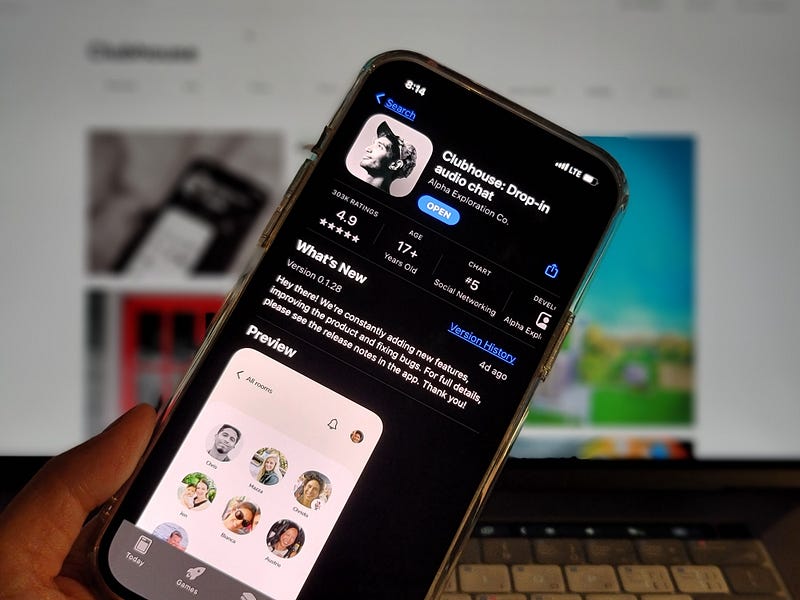The Future of Clubhouse: Monetization Strategies and Smart Assistants
Written on
Chapter 1: The Emergence of Clubhouse
In recent discussions, figures like Mark Zuckerberg, Oprah Winfrey, and Elon Musk have joined the Clubhouse platform, which has gained immense popularity. Entrepreneurs, social media influencers, and life coaches are actively engaging on this app, showcasing diverse opinions on various topics.
Clubhouse has been downloaded millions of times over the past few weeks and is currently only accessible via invitation on iOS devices. The buzz surrounding this app indicates it may represent the future of social media. While the app is free to use, questions arise about how creators and the company might monetize this platform. Here are my thoughts and insights on potential monetization strategies.

What is Clubhouse?
Clubhouse is an audio-only platform where users can participate in conversations with both friends and strangers. Users can explore various "rooms" in the app's "hallway," dropping in to listen to discussions led by speakers and moderators. The unpredictability of what might happen next contributes to the app’s engaging atmosphere.
Users might find themselves in a room where a notable artist or expert unexpectedly joins, changing the direction of the conversation and making it more exciting. Unlike other social media platforms, Clubhouse focuses on keeping the audience engaged in real-time discussions.
Members have the option to create clubs, which function similarly to Facebook groups.
Are Conversations Private?
Clubhouse states that all conversations are recorded but deleted shortly after. These recordings are retained solely for abuse complaint investigations. However, the app operates on the principle that “what’s said is said,” which is integral to its appeal. Nevertheless, there have been instances where conversations have leaked despite the platform's privacy policies.
Monetization on Clubhouse
As of now, Clubhouse is free to all users, and creators are building followings not only on the app but also across social media platforms like Twitter and Instagram. Some creators are adding their CashApp usernames to their bios, allowing followers to send money without revealing their bank account details.
When asked about monetization, developers often provide vague responses. However, users speculate about several potential methods:
- Membership Fees for Clubs: Some clubs may implement fees for access to their exclusive rooms.
- Premium Access to Private Topics: Life coaches may host paid sessions where attendees can listen in or ask questions directly.
- Crowdfunding for Causes: Users can leverage Clubhouse to raise awareness and funds for various causes.
- Sponsored Events: Brands may choose to sponsor rooms, with moderators mentioning the sponsorship during introductions.
While there are numerous opportunities for monetization, the company must balance these with its goal of remaining ad-free. Additionally, there's potential for Clubhouse to facilitate the development of advanced smart assistants like Google Assistant, Alexa, and Siri.
The first video discusses how individuals can earn money using the Clubhouse app in 2024, especially for beginners. It provides insights into strategies for monetization within the platform.
Siri, Alexa, and Other Smart Assistants
Many users encounter difficulties with smart assistants like Siri due to accents and pronunciation challenges, particularly non-native English speakers. A significant portion of the global population is multilingual, yet these assistants often struggle to comprehend mixed-language inputs.
The Washington Post highlighted “The Accent Gap,” revealing that smart speakers typically perform poorly with accented speech. This occurs because they are mainly trained using a standardized dialect, often overlooking the diverse linguistic backgrounds of users.
Clubhouse’s Voice Data Potential
Despite Clubhouse’s commitment to deleting recordings, it is hard to believe that such valuable data would be discarded. The voice data generated within Clubhouse could be instrumental in enhancing smart assistants' capabilities. Users share insights comfortably in diverse dialects, which can be leveraged for AI training.
If Clubhouse anonymizes this voice data, it could sell it to developers seeking to improve the understanding of various accents and dialects in their smart assistants. While users may initially resist the idea of their voice data being utilized, the allure of the platform could encourage acceptance.
The Takeaway
Clubhouse must soon devise effective monetization strategies. The possibility of introducing ads, charging membership fees for clubs, or sharing event revenue are all viable options. However, the user-generated voice data holds immense potential for AI developers, and it would be surprising if a tech company chose to overlook such a resource.
In a world where users enjoy the app for free, it’s essential to recognize that they are, in essence, the product.
The second video delves into how virtual assistants can be leveraged effectively to foster business growth, highlighting cost-saving strategies while maintaining scalability.